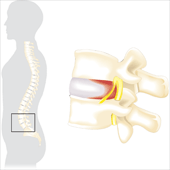Physical Therapy for Back Pain Relief
If you answered yes to any of these questions, you should see a physical therapist. Appropriate physical therapy treatment not only helps to decrease your pain, but it can also help keep it from returning1, which makes it easier to live your life pain free.
The Benefits of Physical Therapy
It's proven effective:
- Response to treatment will vary, but for some, significant pain relief can be achieved in just a couple of physical therapy visits.1
It's safe:
- Physical therapy can be just as effective as surgical intervention for treating back pain, without the risks or side effects.2
It saves you time:
- Waiting time for appointments is typically short and, in most cases, you can be seen within 48 hours of contacting your therapist.3
It saves you money:
- An active physical therapy program could mean better treatment results, cutting costs in prescription medications, MRIs, and lower back injections.4
It's a personalized solution, not just a quick fix:
- Your physical therapist will address the underlying causes of your pain, such as your strength, endurance, mobility, daily activities, and recreational habits. This individualized approach provides long-term relief and prevents future episodes of pain.5

More about Lower Back Pain
Visit our Medical Library for:
- Info on lower pain
- Illustrations
- Possible treatments
- Additional web resources links.
Call us today and start feeling better tomorrow!
(847) 223-8001
If you'd like more information, download the physician referral form below, and ask your doctor if physical therapy is right for you.
Click Here to Download Physician Referral FormReferences:
- Childs JD, Fritz JM, Flynn T, et al. A clinical prediction rule to identify patients with low back pain most likely to benefit from spinal manipulation: a validation study. Ann Intern Med. 2004;141(12):920-928.
- Fairbank J, Frost H, Wilson-Macdonald J, et al; for the Spine Stabilisation Group. Randomised controlled trial to compare surgical stabilisation of the lumbar spine with an intensive rehabilitation programme for patients with chronic low back pain: the MRC spine stabilisation trial. BMJ. 2008;330(7502):1233. Epub 2005 May 23.
- CPTA Patient Survey, 2007.
- Fritz JM, Cleland JA, Speckman M, Brennan GP, Hunter SJ. Physical therapy for acute low back pain: associations with subsequent healthcare costs. Spine. 2008;33(16):1800-1805.
- Delitto A, Erhard RE, Bowling RW. A treatment-based classification approach to low back pain syndrome: identifying and staging patients for conservative treatment. Phys Ther. 1995;75(6):470-485.
NOTE: Physical therapy may not be for everyone, such as those who have a history of cancer, or severe systemic or neurological conditions; those who have experienced recent/significant unexplained weight loss, have structural deformities, have experienced a recent trauma resulting in fractures, or those who have used steroids.
Disclaimer: The information in this website is intended for informational and educational purposes only and in no way should be taken to be the provision or practice of physical therapy, medical, or professional healthcare advice or services. The information should not be considered complete or exhaustive and should not be used for diagnostic or treatment purposes without first consulting with your physical therapist, occupational therapist, physician or other healthcare provider. The owners of this website accept no responsibility for the misuse of information contained within this website.
